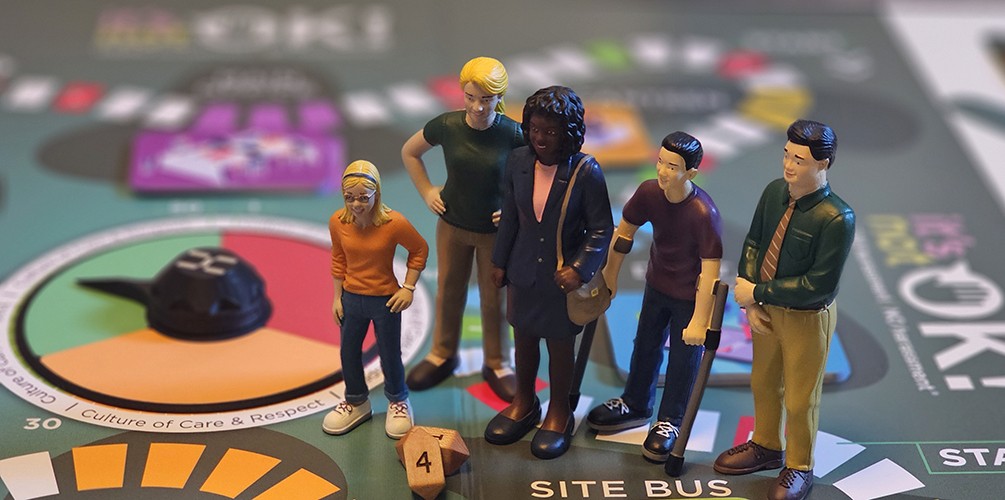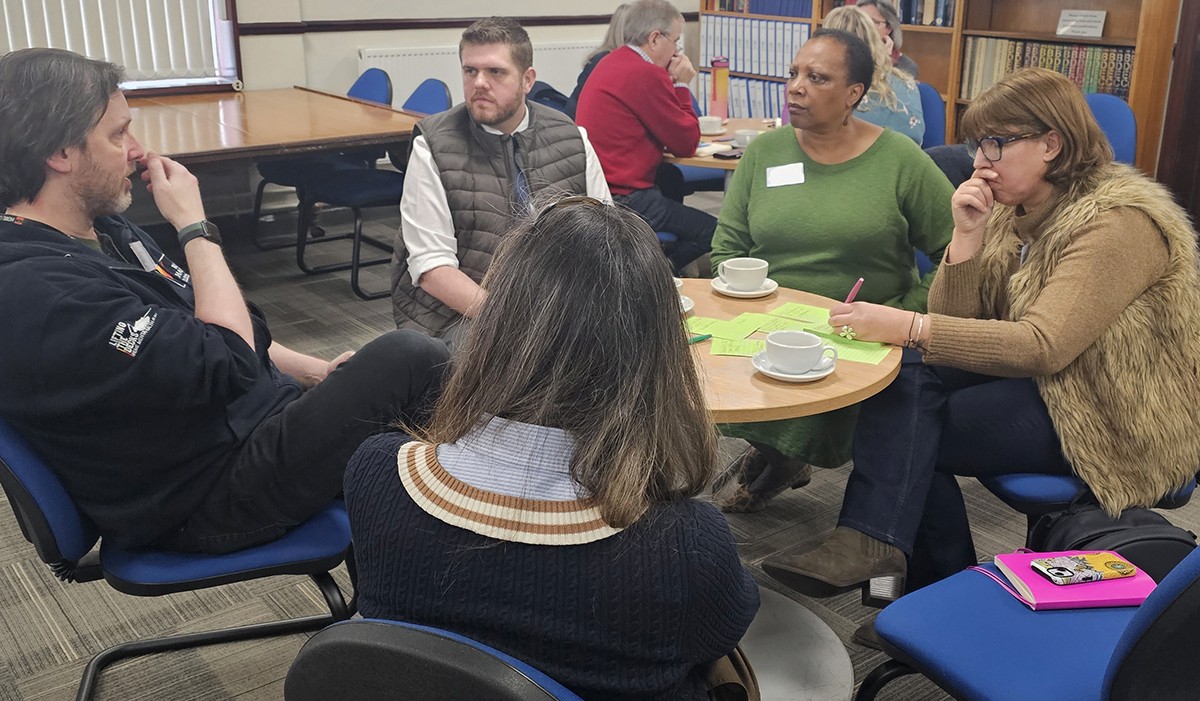Research Highlights
Tuesday, November 4, 2025


Belinda Colston


Megan Walker
Game for Change?
An interactive approach to changing culture in the workplace
Game-based learning
Game-based learning (GBL) integrates games into the educational process, using them as a core part of the educational experience. The game itself becomes the learning tool, allowing participants to actively engage with the material - ‘learning by doing’. GBL fosters crucial 21st-century skills like critical thinking, problem-solving, creativity, and communication and promotes contextual understanding. It increases participants’ engagement, motivation, and learning outcomes by making learning fun and immersive.
Research has shown that innovative and interactive modes of learning, such as game play, result in greater learning retention and allow players to have a greater understanding of the topic at hand compared to traditional training methods [1]. The distinction between active and passive learning strategies are adequately described by the cone of learning (Fig.1), showing participation and simulation - typical activities in game play - to be key aspects of active learning.

Figure 1: The Cone of Learning (adapted from: Northwest Center for Public Health Practice, 2015, Effective adult learning: A toolkit for teaching adults, NWCPHP, University of Washington School of Public Health, Washington, DC, p.15)
Active learning builds confidence by increasing participant engagement and encouraging self-expression, leading to a deeper understanding of the material. By making learners active participants in the learning process, they experience ownership and empowerment, reducing self-doubt, and strengthening the ability to apply knowledge in real-world situations.
Boardgames, in particular, have been shown to increase confidence and empower players to change their behaviour in the workplace [2]. Indeed, one study showed that players retained knowledge and applied their learning in real-world situations even after a year of playing a boardgame [3]. In contrast to other types of interactive training (e.g. role play), and as a consequence of their team-based aspect, boardgames facilitate greater levels of interaction, allowing learning to occur in a non-confrontational and playful environment that encourages problem-solving in a psychologically safe space [4].
Game development
Armed with this knowledge, we went about developing our own portfolio of games to address workplace issues. Our games are designed to encourage team work to improve the organisational or institutional culture in which the players are situated. In light of the recent October 2024 UK legislation that introduced stricter guidelines around addressing sexual harassment in the workplace, our first game “It’s Not OK!” KNOW harassment | NO harassment focuses specifically on sexual harassment in the workplace.
All players work together with this shared goal in mind. The culture is measured using a dial in the centre of the board. Maintaining a positive culture, however, is not easy! It requires a shared commitment and mutual willingness to participate. All players are equipped with knowledge, informed by research literature, about the legal definition of sexual harassment and different methods of intervening when they witness behaviour that may have a negative impact on their culture (the 5Ds of bystander intervention). In order to recognise that it is not always possible to intervene, players start with a limited number of 'capacity points', which represent the 'cost' of intervening. As players move around the board, they will learn more facts about sexual harassment and witness different scenarios involving transgressive behaviour. As a team, they must then decide whether the behaviour constitutes sexual harassment and how to intervene after witnessing this behaviour. If they intervene, their culture improves, if they don’t intervene, their culture declines. The tricky part is maintaining a positive culture without losing the capacity to do so before the game ends!
All the scenarios are based on research literature, real-life reports and tribunals. Every scenario reflects a situation that could be considered problematic, but context is limited and severity differs. This design choice is intended to reflect real-world situations and induce detailed discussions about the behaviour and what could be done to address it (or in deed whether it should be addressed at all). As with many situations, you have limited time to make a judgement call – once the 2-minute timer is up, you have to make a decision! Around the board, you’ll also encounter events, beyond your control, which impact your culture, either positively or negatively.
The game has been designed carefully to be fun, interactive, informative and empowering. It simulates real-world experience without introducing a 'blame culture' as all players are bystanders – not victims or perpetrators. Diverse scenarios are used to represent the complexity of sexual harassment and how it doesn’t just manifest with men being perpetrators and women being victims – avoiding a 'man-bashing' attitude. The team-based approach makes striving for a positive culture everyone’s problem! Players learn from each other as discussions reveal different perspectives on certain behaviours. They are able to explore serious, and often difficult, topics within a safe setting with skilled facilitators, allowing them to adopt realistic intervention mechanisms that can be deployed in real-life situations.
All games are bespoke to a particular setting, incorporating the organisational structure, environments and ethos with real scenarios taken from (anonymised) formal complaints or anecdotal experiences to truly simulate players’ experiences.

Read more about our Game for Change and how we can help you create a culture of trust and respect in your workplace.
"It's Not OK!" KNOW harassment | NO harassment is available through workshops facilitated by Halsden or through our annual licensing agreement.
References
[1] Sardone and Devlin-Scherer (2016:215)
[2] Wait, M. &. Frazer, M., 2018, ‘Investigating retention and workplace implementation of board game learning and employee development’, Acta Commercil 18(1), a599, p.6
[3] Ibid.
[4] Ibid., p.2
Game-based learning
Game-based learning (GBL) integrates games into the educational process, using them as a core part of the educational experience. The game itself becomes the learning tool, allowing participants to actively engage with the material - ‘learning by doing’. GBL fosters crucial 21st-century skills like critical thinking, problem-solving, creativity, and communication and promotes contextual understanding. It increases participants’ engagement, motivation, and learning outcomes by making learning fun and immersive.
Research has shown that innovative and interactive modes of learning, such as game play, result in greater learning retention and allow players to have a greater understanding of the topic at hand compared to traditional training methods [1]. The distinction between active and passive learning strategies are adequately described by the cone of learning (Fig.1), showing participation and simulation - typical activities in game play - to be key aspects of active learning.

Figure 1: The Cone of Learning (adapted from: Northwest Center for Public Health Practice, 2015, Effective adult learning: A toolkit for teaching adults, NWCPHP, University of Washington School of Public Health, Washington, DC, p.15)
Active learning builds confidence by increasing participant engagement and encouraging self-expression, leading to a deeper understanding of the material. By making learners active participants in the learning process, they experience ownership and empowerment, reducing self-doubt, and strengthening the ability to apply knowledge in real-world situations.
Boardgames, in particular, have been shown to increase confidence and empower players to change their behaviour in the workplace [2]. Indeed, one study showed that players retained knowledge and applied their learning in real-world situations even after a year of playing a boardgame [3]. In contrast to other types of interactive training (e.g. role play), and as a consequence of their team-based aspect, boardgames facilitate greater levels of interaction, allowing learning to occur in a non-confrontational and playful environment that encourages problem-solving in a psychologically safe space [4].
Game development
Armed with this knowledge, we went about developing our own portfolio of games to address workplace issues. Our games are designed to encourage team work to improve the organisational or institutional culture in which the players are situated. In light of the recent October 2024 UK legislation that introduced stricter guidelines around addressing sexual harassment in the workplace, our first game “It’s Not OK!” KNOW harassment | NO harassment focuses specifically on sexual harassment in the workplace.
All players work together with this shared goal in mind. The culture is measured using a dial in the centre of the board. Maintaining a positive culture, however, is not easy! It requires a shared commitment and mutual willingness to participate. All players are equipped with knowledge, informed by research literature, about the legal definition of sexual harassment and different methods of intervening when they witness behaviour that may have a negative impact on their culture (the 5Ds of bystander intervention). In order to recognise that it is not always possible to intervene, players start with a limited number of 'capacity points', which represent the 'cost' of intervening. As players move around the board, they will learn more facts about sexual harassment and witness different scenarios involving transgressive behaviour. As a team, they must then decide whether the behaviour constitutes sexual harassment and how to intervene after witnessing this behaviour. If they intervene, their culture improves, if they don’t intervene, their culture declines. The tricky part is maintaining a positive culture without losing the capacity to do so before the game ends!
All the scenarios are based on research literature, real-life reports and tribunals. Every scenario reflects a situation that could be considered problematic, but context is limited and severity differs. This design choice is intended to reflect real-world situations and induce detailed discussions about the behaviour and what could be done to address it (or in deed whether it should be addressed at all). As with many situations, you have limited time to make a judgement call – once the 2-minute timer is up, you have to make a decision! Around the board, you’ll also encounter events, beyond your control, which impact your culture, either positively or negatively.
The game has been designed carefully to be fun, interactive, informative and empowering. It simulates real-world experience without introducing a 'blame culture' as all players are bystanders – not victims or perpetrators. Diverse scenarios are used to represent the complexity of sexual harassment and how it doesn’t just manifest with men being perpetrators and women being victims – avoiding a 'man-bashing' attitude. The team-based approach makes striving for a positive culture everyone’s problem! Players learn from each other as discussions reveal different perspectives on certain behaviours. They are able to explore serious, and often difficult, topics within a safe setting with skilled facilitators, allowing them to adopt realistic intervention mechanisms that can be deployed in real-life situations.
All games are bespoke to a particular setting, incorporating the organisational structure, environments and ethos with real scenarios taken from (anonymised) formal complaints or anecdotal experiences to truly simulate players’ experiences.

Read more about our Game for Change and how we can help you create a culture of trust and respect in your workplace.
"It's Not OK!" KNOW harassment | NO harassment is available through workshops facilitated by Halsden or through our annual licensing agreement.
References
[1] Sardone and Devlin-Scherer (2016:215)
[2] Wait, M. &. Frazer, M., 2018, ‘Investigating retention and workplace implementation of board game learning and employee development’, Acta Commercil 18(1), a599, p.6
[3] Ibid.
[4] Ibid., p.2





